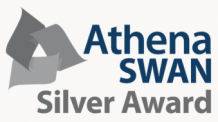Articles

Athena Swan awards recognise the impact of a departments actions on equality
Coveted awards recognise Exeter’s commitment to gender equality
Prestigious Athena SWAN awards have just been granted to two University of Exeter departments to recognise their commitment to gender equality.
The College of Medicine and Health is celebrating a renewal of its Silver award, whilst Engineering is celebrating the renewal of its Bronze award.
An Athena SWAN silver award is highly coveted, and is granted in recognition of the positive impact of actions that a department has undertaken around gender and wider equality and providing a positive working environment. The bronze award recognises a department achievements in progressing gender equality with their organisation, together with a commitment to future improvement.
Advance HE’s Athena SWAN charter began as a charter focused on academic women in science, technology, engineering, maths and medicine. Since then the scope has widened to recognise work undertaken to address gender equality more broadly, not just barriers to progression that affect women. The scope now includes staff in professional and support roles, trans staff and students, and those in subjects including humanities and the arts.
Professor Janice Kay, Provost of the University of Exeter, said: “I’m absolutely delighted that our commitment to equality has been recognised. We’ve done a huge amount of work in the past few years to try to make sure everyone in our organisation has every opportunity to meet their potential, while balancing the needs of their professional and personal lives. We’re not complacent and the work is ongoing, however we must celebrate this fantastic recognition of our inclusive ethos.”
Since last securing a Silver award in 2014, the College of Medicine and Health has implemented a number of significant steps towards promoting gender equality. Part of a £10 million donation from the Dennis and Mireille Gillings Foundation was designed to employ world-leading professors who excel in research, and are committed to promoting women in science. The three roles are soon to be announced.
The College has also supported an increased number of staff to work flexible hours to accommodate needs such as childcare. It has also raised the number of female staff taking up leadership and career development opportunities, and improved the career progression pipeline through a sustained increase in the number of female academics being promoted to Associate Professor.
Professor Clive Ballard, Executive Dean and Pro Vice-Chancellor of the University of Exeter Medical School, said: “I’m incredibly proud of our silver award, which recognises the commitment of a wide range of our staff. We strive to ensure equality is at the heart of all we do. Assessment for the prestigious awards are incredibly rigorous and the university is delighted by these recent achievements. Congratulations and a huge thanks to everyone throughout the College for their hard work and dedication in this crucial area.”
Professor Paul Reynolds, Head of Department and Inclusivity Group Chair for Engineering at the time of submission, said: “I’m very proud of our achievements to date and the department look forward to making further strides to make Engineering and Camborne School of Mines a beacon of inclusivity.”
Since Engineering’s first Bronze award, two thriving Early Career Networks have been established at Exeter and Cornwall campuses since the last application. They provide networking and career support opportunities for early career staff including workshops with senior academics and set up a ‘The Stories of My Biggest Failures’ event, where established academics shared their experiences of learning from setbacks.
A redesign of undergraduate and postgraduate taught programmes is incoming for Engineering 2020, to build in new pedagogies and challenge-led learning, giving students a clearer contextual background to their technical learning, and providing a sense of inspiration that Engineering can provide solutions to the world’s most challenging problems.
The department has also increased the proportion of female staff since 2014 from 16.5% to 25.2% overall.
Date: 10 October 2019
